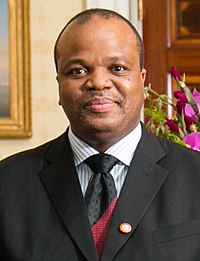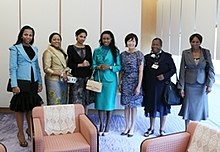This is the current revision of this page, as edited by 2a02:8012:227b:0:a1a3:5472:ffa3:e70a (talk) at 13:06, 28 August 2024 (Removed Category:Monarchies of South Africa as already in Category:Swazi royalty but mostly because Eswatini is not part of South Africa). The present address (URL) is a permanent link to this version.
Revision as of 13:06, 28 August 2024 by 2a02:8012:227b:0:a1a3:5472:ffa3:e70a (talk) (Removed Category:Monarchies of South Africa as already in Category:Swazi royalty but mostly because Eswatini is not part of South Africa)(diff) ← Previous revision | Latest revision (diff) | Newer revision → (diff) Reigning dynasty in Eswatini| House of Dlamini | |
|---|---|
 Coat of arms of Eswatini Coat of arms of Eswatini | |
| Country | Eswatini |
| Current head | Mswati III |
| Titles | King of Eswatini Queen Mother of Eswatini Ndlovukazi Mhlekazi Nkhosi |
The House of Dlamini is the royal house of the Kingdom of Eswatini. Mswati III, as king and Ngwenyama of Eswatini, is the current head of the house of Dlamini. Swazi kings up to the present day are referred to as Ingwenyama and they rule together with the Queen Mother who is called Indlovukati. The Swazi kings, like other Nguni nations, practice polygamy and thus have many wives and children.
Foundations
The Dlamini dynasty traces itself back to a chief Dlamini I (also known as Matalatala), who is said to have migrated with the Swazi people from East Africa through Tanzania and Mozambique. Ngwane III, however, is often considered to be the first King of modern Eswatini, who ruled from 1745 to 1780. In the early years of the Dlamini dynasty, the people and the country in which they resided was called Ngwane, after Ngwane III.
In the early 19th century, the Dlamini centre of power shifted to the central part of Eswatini, known as Ezulwini valley. This occurred during the rule of Sobhuza I. In the south of the country (present day Shiselweni), tensions between the Ngwane and the Ndwandwe led to armed conflict. To escape this conflict, Sobhuza moved his royal capital to Zombodze. In this process, he conquered many of the earlier inhabitants of the country, thereby incorporating them under his rule. Later on, Sobhuza was able to strategically avoid conflict with the powerful Zulu kingdom which was now ruling in the south of the Pongola River. The Dlamini dynasty grew in strength and ruled over a large country encompassing the whole of present Eswatini during this time.
The royal family


The royal family includes the king, the queen mother, the king's wives (emakhosikati), the king's children, as well as the king's siblings, the king's half-siblings and their families. Due to the practice of polygamy, the number of people who can be counted as members of the royal family is relatively large. For example, King Mswati III is thought to have over 200 brothers and sisters.
Members of the royal family, including the king himself, have courted both internal and international controversy. The king and his household have been criticized for their lavish spending in a country with high poverty rates. Reports have claimed that the king's large number of spouses and children "take up a huge chunk of the budget" and that "the royal family seems to live in its own world that is totally unaffected by the country's struggles".
The king's siblings include Mantfombi Dlamini, the Queen of the Zulus of South Africa, while one of his in-laws is Princess Zenani Mandela-Dlamini, a member of the Mandela chieftaincy family of Mvezo, South Africa.
Several members of the royal family have been educated abroad: King Mswati III spent several years at Sherborne School, in Dorset, England, and his eldest daughter Inkhosatana Sikhanyiso Dlamini has studied at St Edmund's College, Ware, in Hertfordshire, and Biola University, in California, United States.
The current official residence of the royal family is the Ludzindzini Palace in Lobamba; other royal palaces exist for the queen consorts. He has received criticism for his "lavish" spending habits.
See also
References
- United States Department of State
- Leonard, Thomas M., ed. (2006). Encyclopedia of the Developing World. Vol. 3. NY, USA: Routledge. p. 1512. ISBN 9780415976640. Retrieved 27 June 2014.
- "Swaziland Profile, King: Mswati III". BBC. 19 December 2013. Retrieved 27 June 2014.
- "Who We Are". The Government of the Kingdom of Swaziland. n.d. Archived from the original on 31 October 2013. Retrieved 27 June 2014.
- D. Hugh Gillis (30 March 1999). The Kingdom of Swaziland. Greenwood Publishing Group. ISBN 978-0-313-30670-9.
- Macdonald, Fiona; Paren, Elizabeth; Shillington, Kevin; Stacey, Gillian; Steele, Philip (2003) . Peoples of Africa (reference ed.). NY, USA: Marshall Cavendish. p. 505. ISBN 9780761471585. Retrieved 4 July 2014.
- Matsebula, Bhekie (4 December 2001). "Profile: Troubled King Mswati". BBC. Retrieved 27 June 2014.
- Chothia, Farouk (12 July 2011). "Swaziland: A kingdom in crisis". BBC. Retrieved 27 June 2014.
- David, Smith (26 July 2012). "Swaziland royals cause anger with Las Vegas trip". The Guardian. Retrieved 27 June 2014.
- Busari, Stephanie (May 29, 2008). "British blue blood top 'Hottest Royal' list". CNN. Retrieved May 12, 2011.
- Rosen, Jonathan (October 3, 2014). "Last Dance for the Playboy King of Swaziland?". National Geographic. Archived from the original on October 4, 2014. Retrieved July 7, 2017.